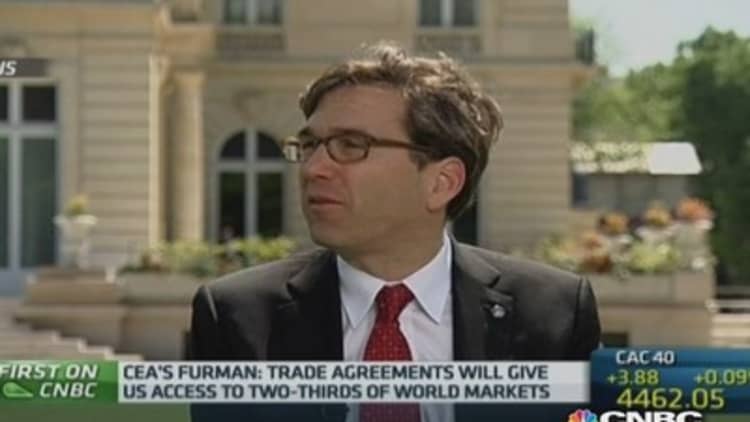
The chairman of the President's Council of Economic Advisors (CEA) said that it was important to cut tax breaks and incentives on high-income households as part of a general overhaul of the U.S. economy.
Jason Furman, who became chairman of the CEA last June, told CNBC that "economically" it was a sensible strategy to cut the deficit by partly ensuring that high-income households pay more tax.
"We don't need to raise tax rates on high-income households," Furman added. "We raised them back to what they were in the 1990s. Going forward, you can just cut some of the tax breaks and tax incentives that high-income households get; cut back on the subsidies that high-income households get for a mortgage or health care or retirement savings."
Furman was speaking as the U.S. economy posted positive data last week. Job creation accelerated in April as the U.S. economy added 288,000 new positions, while the unemployment rate plummeted to 6.3 percent. Economists had been anticipating 210,000 new jobs and a 6.6 percent rate.
However, commentators pointed out that the labor force participation rate slumped to 62.8 percent—near 35-year lows—and the lack of quality jobs in the market.
Talking to CNBC at the gathering of the Organization for Economic Co-operation and Development (OECD) in Paris, Furman said that while the unemployment rate keeps coming down, a greater change is needed in the U.S. economy.
"Prior to the great recession we had a challenge that was decades in the making in terms of how the economy was working for ordinary families and that's not something we're going to solve in a year or two, it's something I think we can solve, but it's going to take a lot more than just recovering," Furman said.
Inequality has become the key focus of President Barack Obama's final term in office. In a speech to a think tank in Washington D.C. last December, Obama described it as the "defining issue of our time."
Read MoreDo you have a tax-wise portfolio?
With a consensus emerging that the global economy is becoming more stable, the debate has turned toward rising inequality. Over two years after Occupy Wall Street, which some at the time argued had failed in its goals, some analysts have pointed out that the issues the movement raised are slowly filtering into the political discourse both in the U.S. and around the world.
The Obama administration has focused on raising the national minimum wage. Last week, Republicans in the U.S. Senate blocked a Democratic-backed rise to the minimum wage rate.
Furman argued against the Republicans' stance that a wage hike would be bad for employers.
"A stronger economy is good for everyone: it's good for capitalists, it's good for worker," he said. "You see a lot of businesses that understand that when you pay people more, it reduces their turnover, it increases the motivation for their employees, and it can be a smart business decision. That's why we did it in the federal government; we gave a raise to all of our contractors and we did that as part of a strategy to improve the economy and efficiency of the federal government."
Responding to concern about the professionalism of those jobs coming back into the market, Furman said: "In the first stage of the recovery the most important thing is just getting the jobs at all."
On Monday, Berkshire Hathaway chairman and CEO Warren Buffett told CNBC that "you are getting more mergers that are tax driven" and Congress is "likely to address" the issue.
Congress might, he said, might focus on the narrow section of the tax code that allows a company that merges to move its tax domicile, or "that forces them to rethink all corporate taxes, we'll find out. But I do think it will get attention."
"This whole thing on the foreign situation, I think, will cause one hell of a fight in Corporate America."
Read MoreBuffett: Congress likely to tackle tax-dodging mergers
Commenting on the U.S. corporate tax system, Furman said they were trying to cut the rate and broaden the tax so that the system was more competitive. He said that "you'll see some companies paying less in taxes, becoming more competitive, and you'll see others paying more, especially those that are paying a very low amount of taxes today.
He did state: "The international part of America's tax system is broken and in need of a reform. What we need is a hybrid system that helps prevent the American tax base from being eroded so we can raise enough money to cut tax rates for companies doing business in the United States."
—By CNBC's Kiran Moodley


